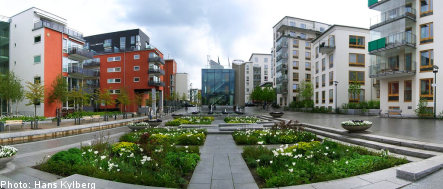The slump in housing prices between July and September has been felt primarily by owners of apartments rather than houses, and for people living in the Stockholm area.
According to a survey by state-owned mortgage company SBAB, estate agents project that prices will continue to fall in Sweden’s larger cities.
Final sale prices are now often lower than publicized offer prices, with few bidders competing for any given property.
Three of four agents polled said that the financial crisis has had a major impact on the market for apartments, while six out of ten reported the same trend for houses.
A record number of estate agents reported that housing prices sank during the third quarter.
SBAB’s estate agent barometer comes from questionnaire distributed to 210 estate agents located in Stockholm, Gothenburg, and Malmö between September 25th and October 8th.
Furthermore, a new forecast from Sweden’s National Board of Housing, Building and Planning (Boverket) projects that the number of new housing starts through the end of 2008 will decrease by 40 percent, or 16,000 units, compared with the number of houses and apartments built in 2006.
According to a statement from the agency, the number of rental units currently under construction has been cut in half since 2006 as a result of increased construction costs and the loss of state-sponsored supports.
Boverket also reports that demand for houses and cooperative apartments for purchase (bostadsrätter), has started to drop, adding however that its forecast remains uncertain.
“The consequences of the financial crisis and the weakening economy cannot be overlooked. We see, however, the possibility of a slight increase in the construction of rental apartments in the next few years,” said Boverket in a statement.
According to the agency’s own assessment, Sweden needs to build around 38,000 new homes a year between 2008 and 2012.
While 2008 has been marked by a relatively high rate of new housing starts, Boverket projects activity to cool off substantially in 2009 and 2010.
Nor is the agency optimistic about the chances that Sweden will meet what’s needed to maintain the current standards of the country’s housing stock.
As a result, says Boverket, residents in Sweden’s larger cities can expects the housing situation to become even more strained in the years ahead.




 Please whitelist us to continue reading.
Please whitelist us to continue reading.